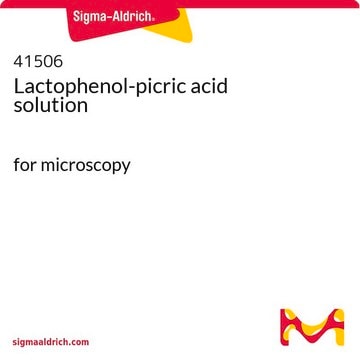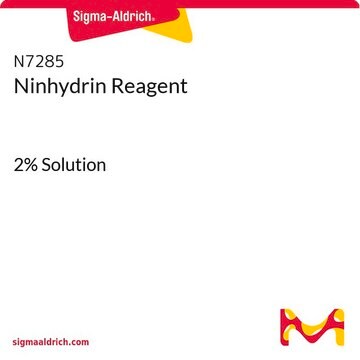197378
Picric acid
moistened with water, ≥98%
Synonym(s):
2,4,6-Trinitrophenol, PA
About This Item
Recommended Products
vapor density
7.9 (vs air)
Quality Level
vapor pressure
1 mmHg ( 195 °C)
Assay
≥98%
form
powder or crystals (with a top layer of Liquid)
contains
≥35% water
expl. lim.
0.01 %
mp
122-123 °C (dried material) (lit.)
solubility
alcohol: 1 (g/12 mL)(lit.)
benzene: 1 g/10 mL
chloroform: 1 (g/35 mL)
diethyl ether: 1 (g/65 mL)
density
1.763 g/cm3
functional group
nitro
SMILES string
Oc1c(cc(cc1[N+]([O-])=O)[N+]([O-])=O)[N+]([O-])=O
InChI
1S/C6H3N3O7/c10-6-4(8(13)14)1-3(7(11)12)2-5(6)9(15)16/h1-2,10H
InChI key
OXNIZHLAWKMVMX-UHFFFAOYSA-N
Looking for similar products? Visit Product Comparison Guide
General description
Application
Signal Word
Danger
Hazard Statements
Precautionary Statements
Hazard Classifications
Acute Tox. 3 Dermal - Acute Tox. 3 Inhalation - Acute Tox. 4 Oral - Desen. Expl. 1
Storage Class Code
4.1A - Other explosive hazardous materials
WGK
WGK 2
Flash Point(F)
302.0 °F - closed cup
Flash Point(C)
150 °C - closed cup
Personal Protective Equipment
Choose from one of the most recent versions:
Already Own This Product?
Find documentation for the products that you have recently purchased in the Document Library.
Our team of scientists has experience in all areas of research including Life Science, Material Science, Chemical Synthesis, Chromatography, Analytical and many others.
Contact Technical Service









